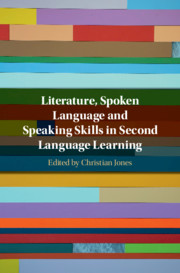Book contents
- Literature, Spoken Language and Speaking Skills in Second Language Learning
- Literature, Spoken Language and Speaking Skills in Second Language Learning
- Copyright page
- Contents
- Figures and Tables
- Contributors
- Foreword
- Acknowledgements
- 1 Introduction
- Part I Literature and Spoken Language
- Part II Literature and Speaking Skills
- 7 EFL Learners Reading and Discussing Poems in English
- 8 An Analysis of Collaborative Dialogue in Literature Circles
- 9 Exploring Literary Texts as a Tool for Developing L2 Oral Proficiency
- 10 Conclusion: Implications for Pedagogy and Research
- Index
- References
9 - Exploring Literary Texts as a Tool for Developing L2 Oral Proficiency
from Part II - Literature and Speaking Skills
Published online by Cambridge University Press: 18 October 2019
- Literature, Spoken Language and Speaking Skills in Second Language Learning
- Literature, Spoken Language and Speaking Skills in Second Language Learning
- Copyright page
- Contents
- Figures and Tables
- Contributors
- Foreword
- Acknowledgements
- 1 Introduction
- Part I Literature and Spoken Language
- Part II Literature and Speaking Skills
- 7 EFL Learners Reading and Discussing Poems in English
- 8 An Analysis of Collaborative Dialogue in Literature Circles
- 9 Exploring Literary Texts as a Tool for Developing L2 Oral Proficiency
- 10 Conclusion: Implications for Pedagogy and Research
- Index
- References
Summary
Numerous publications have examined the impact that studying literature has had on second language (L2) development across modes, including its usefulness for advancing language awareness (Lin ), academic writing (Fogal ), reading comprehension (Paesani ) and general academic performance (Badran ). However, limited studies – and with varying results – have explored the utility of studying literary texts for enhancing L2 oral proficiency. Moreover, the sparse literature on this topic blurs an already narrow conception of how literary texts impact L2 oral proficiency and thus invites further research. To address this concern, the present classroom-based study examined changes in L2 learners’ lexical complexity (operationalised as lexical density, diversity and sophistication) after a semester of studying English literature within the context of a discussion and presentation course. Data were collected from a first-year class in an English literature department at a private university in Japan and comprised audio recordings of classroom interactions, classroom observations, post-semester interviews with learners and evidence-based reflections compiled by the course instructor. To examine changes in lexical complexity, a pre-test post-test research design was used, and a Wilcoxon signed-rank test was employed to compare changes in lexical complexity over time. Results showed that learners made no statistically significant gains in oral proficiency. This study discusses pedagogical concerns related with this outcome and offers suggestions for balancing classroom attention on literature, the learner and the language of the text. This work also contributes to advancing research methods related to investigating the efficacy of studying literary texts for developing L2 oral proficiency.
- Type
- Chapter
- Information
- Publisher: Cambridge University PressPrint publication year: 2019

